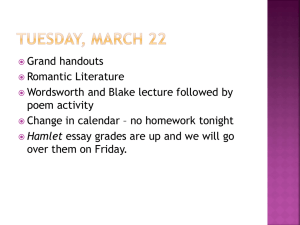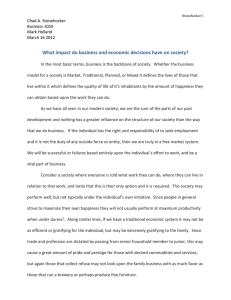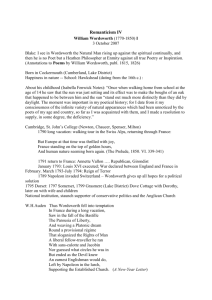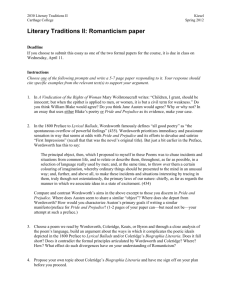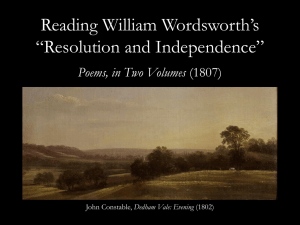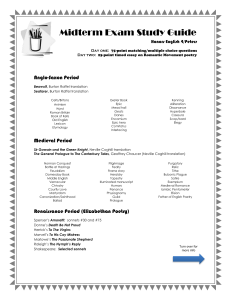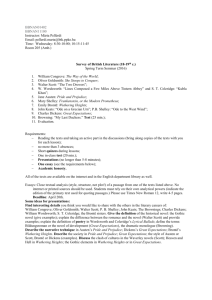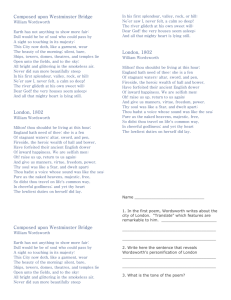Strange power of speech Please share
advertisement
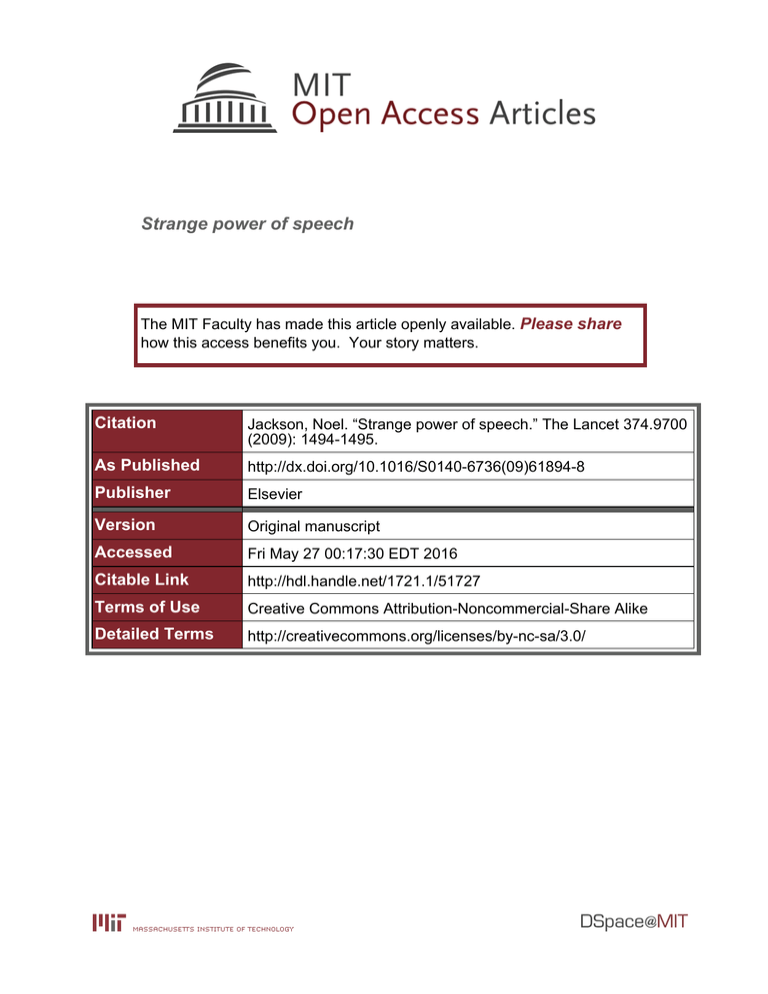
Strange power of speech The MIT Faculty has made this article openly available. Please share how this access benefits you. Your story matters. Citation Jackson, Noel. “Strange power of speech.” The Lancet 374.9700 (2009): 1494-1495. As Published http://dx.doi.org/10.1016/S0140-6736(09)61894-8 Publisher Elsevier Version Original manuscript Accessed Fri May 27 00:17:30 EDT 2016 Citable Link http://hdl.handle.net/1721.1/51727 Terms of Use Creative Commons Attribution-Noncommercial-Share Alike Detailed Terms http://creativecommons.org/licenses/by-nc-sa/3.0/ A friend in graduate school once told me that whenever she was particularly moved by a poem or novel she would hurl the book she was reading across the room. The most recent book to have met this fate was Charles Dickens’s Hard Times, which she had thrown upon reaching the end of the novel’s second volume. The culminating chapter of this volume ends, appropriately enough, with a thud: in the chapter entitled “Down,” Dickens brings the novel to its deepest point of crisis when Louisa collapses in a heap at the feet of her father, Thomas Gradgrind, who sees with horror “the pride of his heart and the triumph of his system, lying, an insensible heap, at his feet.” My friend’s habit struck me as a bizarre way of responding to moments of terrific beauty in literary works of art. But hers is by no means the oddest account of imagination’s power to affect our minds and bodies. Both Hard Times and my friend’s unorthodox response to it tell us something about the tendency of imagination to exert its power often against our will. Dickens’s novel is above all concerned with the resilience of the “Fancy” in the face of the intellectual system that would vitiate it. Gradgrind is of course a monstrous parody of the utilitarian mentality of nineteenth-century England; his commitment to the primacy of useful Facts is so strong as to exclude all those experiences and stirrings of the soul that, for Dickens, make life worth the living. Wonder, desire, reverie, sympathy, love – Dickens describes all of these experiences as springing more or less directly from the “Fancy,” which faculty stands as the necessary corrective to a narrowly utilitarian rationality. Louisa’s collapse at the end of the second book signals the deadly insufficiency of Gradgrind’s system. The burden of living exclusively under the rule of reason has become for Louisa unsustainable, and she collapses, physically and morally, under its weight. Louisa’s cry to her father at the end of the chapter thus prefigures the moral regeneration of both father and daughter by the conclusion of the novel: “your philosophy and your teaching will not save me…Save me by some other means!” Of Dickens’s characters, it is Louisa who articulates most plainly the central theme of Hard Times: there is always something that exceeds rational containment; a time will 2 inevitably come in which reason alone will not be enough. Dickens’s novel is a brief for the power of the Fancy to restore us, by force if necessary, to our senses. Imaginative literature illustrates this power, again and again, by reflecting on the power of words to wound or heal. The question of how literature affects our minds and bodies is at once very old – see, for instance, Aristotle’s discussion of catharsis in the Poetics – and very new, as witnessed in contemporary work taking place at the intersection of literary aesthetics and cognitive neuroscience. But it is arguably among the Romantic generation of English poets that such inquiries into the physical nature of aesthetic response receive their fullest elaboration. Aesthetics, the philosophical study of art and art perception, took its name in the middle of the eighteenth century from the Greek word aisthesis or sense perception. From its inception as an autonomous field of study, the discipline of thinking about art was conceived as an inquiry into how art effects us, how it makes us feel. Small wonder, then, that so many English poets of the eighteenth and early nineteenth centuries – Mark Akenside, Erasmus Darwin, George Crabbe, and John Keats, to name a few – were also students and practitioners of medicine. When William Wordsworth defined poetry as a “science of feelings,” his intention was partly to signal how imaginative literature might serve as a medium for transforming the bodily constitution of its readers or auditors – its aim, as Wordsworth variously insisted, to widen the sphere of sensibility, produce “new compositions of feeling,” create the taste by which the writer is to be enjoyed. Perhaps the paradigmatic example of how words seize control over us is furnished by Samuel Taylor Coleridge’s great poem of 1798, “The Rime of the Ancient Mariner.” Coleridge’s frame-narrative embeds the Mariner’s tale within an account of its reception by an unnamed “Wedding Guest,” who is at the outset of the poem unaccountably chosen by the old man as his destined auditor: The wedding-guest sate on a stone, He cannot chuse but hear: And thus spake on that ancyent man, 3 The bright-eyed Marinere. The Mariner’s “strange power of speech” binds the Wedding Guest by a kind of mesmeric influence that holds to the end of his fantastic tale of guilt and expiation. Before rising “A sadder and a wiser man” the following morning, the Wedding Guest’s immediate response to the Mariner’s tale is to be knocked unconscious by it: “He went, like one that hath been stunn’d / And is of sense forlorn.” As in the case of Hard Times, Coleridge demonstrates how words that sensitize us as moral beings may initially anesthetize us on the path to achieving their purpose. Published in the same year as Coleridge’s “Rime of the Ancient Mariner,” Wordsworth’s ballad “Goody Blake and Harry Gill” reflects in similar terms on the capacity of language to serve as an instrument of physical force. The poem tells the story of a village farmer who is the victim of an old woman’s curse. Harry Gill has lain in wait for Goody Blake, whom he suspects has been gathering sticks from his property to build her fire. The decisive moment of her apprehension proves fatefully decisive for Harry: She pray’d, her wither’d hand uprearing, While Harry held her by the arm – “God! who art never out of hearing, O may he never more be warm!” The cold, cold moon above her head, Thus on her knees did Goody pray, Young Harry heard what she had said, And icy-cold he turned away. The cold-hearted Harry Gill is stricken by a physical cold that no blankets and coats can undo: “live as long as live he may,” the narrator reports, “He never will be warm again.” The externalization of an inner psychological state suggests a moral universe akin to that of Dante’s Inferno, and indeed the ballad of Goody Blake is a deeply moral tale, with its closing caution to “farmers all” against behaving as uncharitably as did Harry Gill. No 4 less than in the case of Hard Times, however, Wordsworth’s poem constitutes a powerful reflection on the psychology of the imagination and its tremendous, at times terrifying, efficacy. In the preface to the Lyrical Ballads, the volume in which both “Goody Blake” and Coleridge’s “Rime” first appeared, Wordsworth wrote that his poem was written to illustrate that “the power of the human imagination is sufficient to produce such changes even in our physical nature as might almost appear miraculous.” The imagination can heal, Wordsworth insists – indeed, more than any other poet, Wordsworth has been celebrated for what Matthew Arnold called the unique gift of poetic “healing power.” But the imagination can also harm. These Romantic poems may be fantasies of a sort – fictions of the all-powerful author. But in neither case is such “miraculous” physical alteration the effect of art. Instead, both poems offer sensitive meditations on the manner in which “language and the human mind act and react on each other,” as Wordsworth defined one of the principal concerns of the Lyrical Ballads. The ballad of Goody Blake is preeminently an exploration into human psycho-physiology, a study of how the mind, and its most potent instrument of language, is capable of acting upon the body. Wordsworth subtitled his ballad “A True Story,” and in the preface reemphasized the tale’s basis in fact. The details for the ballad are drawn from an incident cited in Erasmus Darwin’s Zoonomia (1794-6), at the time a massively influential medical treatise by the Birmingham physician and poet (and grandfather of Charles Darwin). In early 1798, Wordsworth made an urgent request of his publisher to have “Dr Darwin’s Zoönomia” sent to his residence in Somerset. Like any scrupulous author, Wordsworth wanted to get the facts straight before publishing his book, and was familiar enough with the medical literature of his day to have found in Darwin’s case history the inspiration for his poem. There are differences, as we might expect, between the physician’s account and the poet’s. Darwin cites the case history of the Warwickshire farmer as an instance of what he names mania mutabilis, “mutable madness.” He regards the “insane idea” that takes root in the farmer’s mind as illustrative of the mind’s suggestibility to influence. If Wordsworth, on the contrary, does not straightforwardly interpret this case as a delusion 5 on the farmer’s part, it is because he wants to make room for the possibility that words (including the poet’s words) may be capable of working such miraculous “changes even in our physical nature.” Harry’s teeth, which “chatter, chatter, chatter still” throughout the poem, give to the ballad a hypnotic, compulsively physical rhythm that tacitly reinforces Wordsworth’s point. As the Romantics believed, imaginative literature communicates by means of words that are felt before they are understood, and may indeed be capable of short-circuiting the automatic passage of physical sense-perception into conscious thought. This conception of poetic thinking as pre- or even anti-rational is taken up by the greatest of England’s physician-poets, John Keats, who conveys in a single verse couplet his sense of wonder at “[t]he hearty grasp that sends a pleasant sonnet / Into the brain ere one can think upon it.” Among the enigmas of the human brain that the biological sciences have yet to explain fully is how we thus fall under literature’s spell. Further reading Erasmus Darwin, Zoonomia; or, the laws of Organic Life, 2 vols. (London: J. Johnson, 1794-6). Charles Dickens, Hard Times (London: Oxford University Press, 1955). John Keats, Complete Poems, ed. Jack Stillinger (Cambridge: Harvard University Press, 1978). William Wordsworth and Samuel Taylor Coleridge, Lyrical Ballads, ed. R.L. Brett & A.R. Jones, 2nd ed. (Abingdon & New York: Routledge, 2005).
